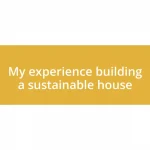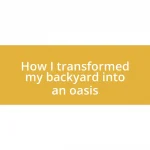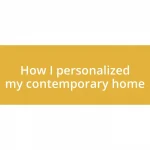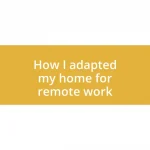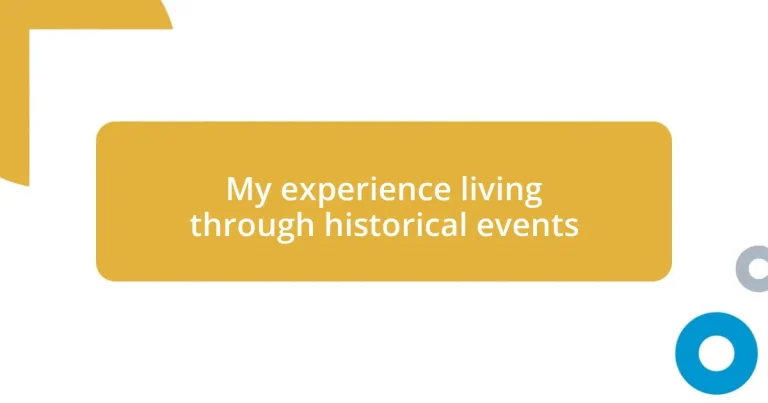Key takeaways:
- September 11, 2001: Significant emotional impact and collective vulnerability highlighted the power of community in times of crisis.
- 2008 Financial Crisis: Emphasized the fragility of stability and the importance of financial literacy and planning amidst uncertainty.
- 2020 Social Justice Demonstrations: Fostered a sense of unity, showcasing the power of allyship and the necessity for advocacy in driving societal change.
- Sharing personal experiences creates connections across generations, offering valuable lessons and fostering resilience and hope for the future.
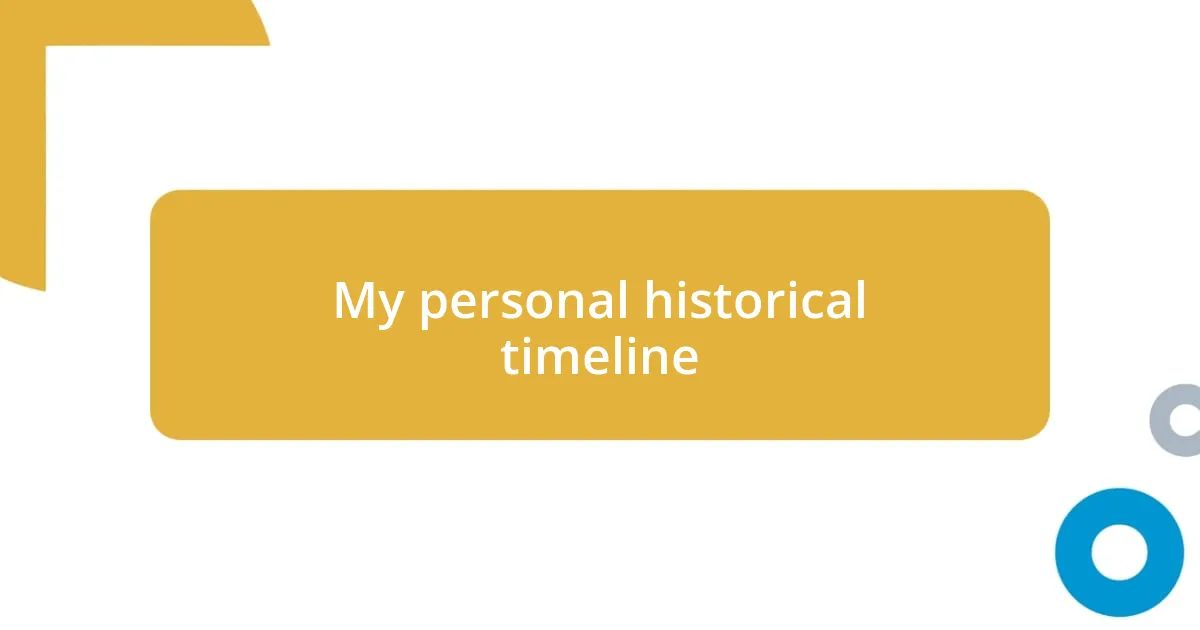
My personal historical timeline
Reflecting on my youth, the events of September 11, 2001, stand out vividly. I remember being in school, the eerie silence after the news broke, and the palpable tension in the air. It was as if we were collectively holding our breath, wondering how our safe little world had changed overnight.
Fast forward to the financial crisis of 2008, which felt like a cold splash of reality. I vividly recall the anxiety as friends lost their jobs and families struggled to make ends meet. It was a harsh lesson in the fragility of stability—one moment, everything seemed fine, and the next, uncertainty loomed around every corner. Can you imagine waking up one day, only to feel the ground beneath you shift completely?
Then there were the peaceful demonstrations for social justice that captured the world’s attention in 2020. I found myself reflecting deeply on the systemic issues that had gone unaddressed for far too long. Participating in those marches, I sensed a shared commitment among strangers, pulling us together with a profound desire for change. Is it possible that sometimes, the most impactful moments in history are those when we join hands in solidarity?
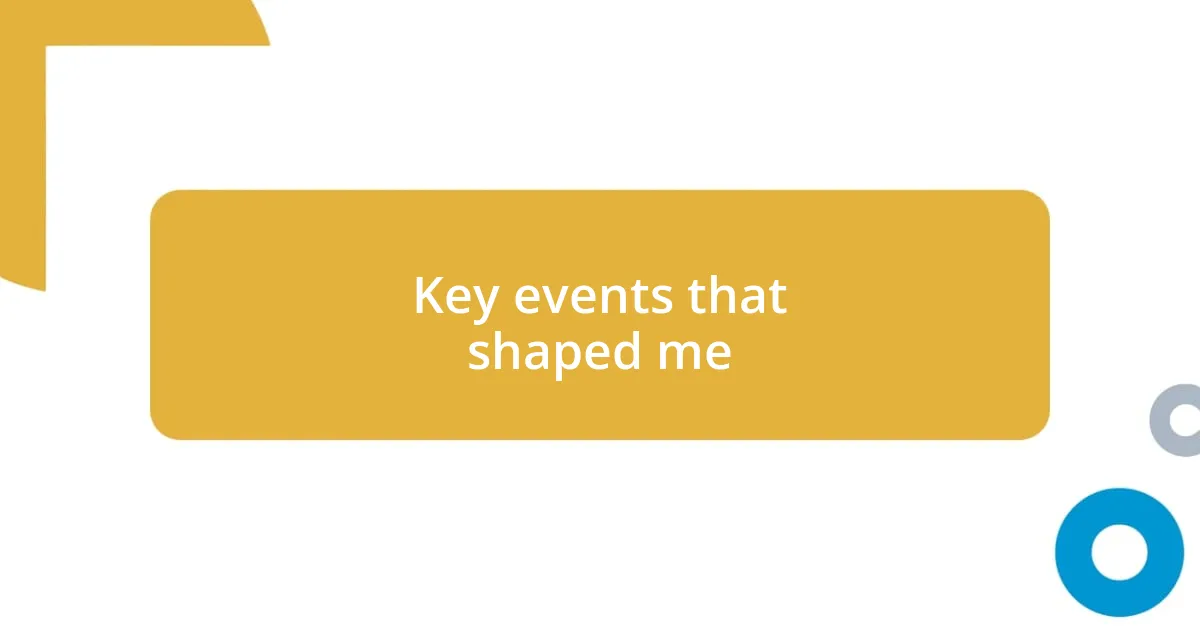
Key events that shaped me
Looking back, the day of the Boston Marathon bombing in 2013 left an indelible mark on me. I remember being enveloped in the warmth of a spring day when suddenly, it felt like the world had turned cold. My friend and I had been planning to attend the event, but last-minute changes kept us away. I felt a wave of guilt mixed with relief—it was a stark reminder that life can shift dramatically in an instant. The fear that gripped our community transcended merely the tragedy; it was a realization of our vulnerability and how interconnected we are.
- September 11, 2001: The eerie silence of my school as we processed the news.
- 2008 Financial Crisis: Feeling helpless as friends lost jobs and futures dimmed.
- 2013 Boston Marathon Bombing: Experiencing an unsettling mix of relief and guilt as tragedy struck.
- 2020 Social Justice Demonstrations: Joining a collective voice that stirred my sense of purpose and hope.
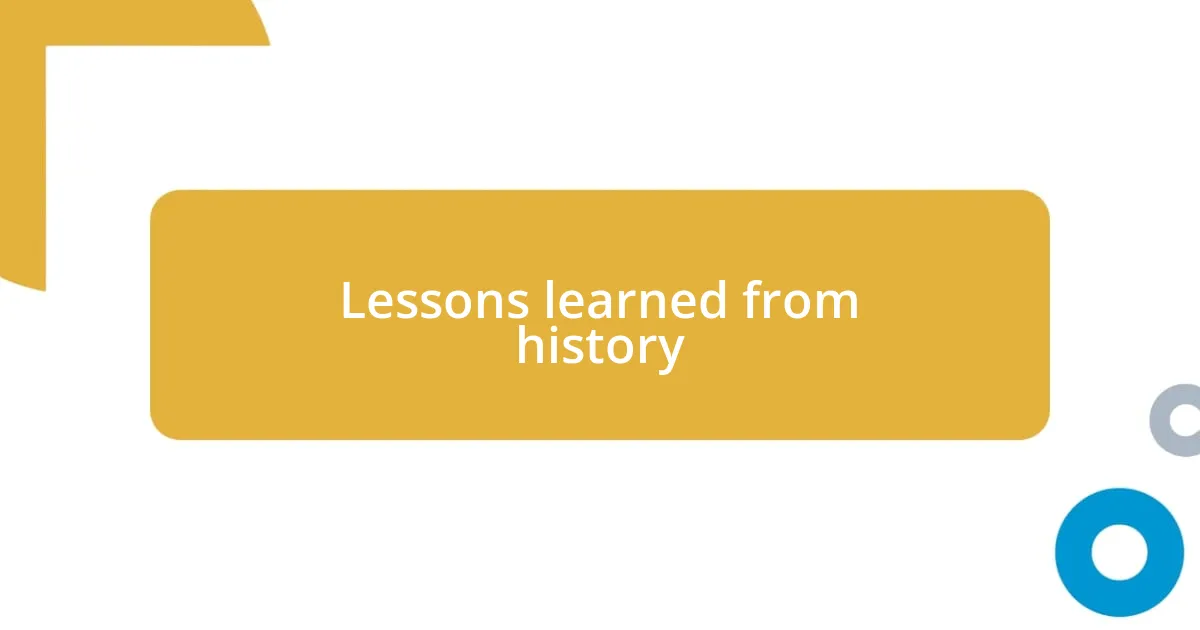
Lessons learned from history
Reflecting on these historical events, I’ve come to realize that the most profound lessons often come with the hardest experiences. For instance, after 9/11, the sense of unity and resilience I observed among strangers taught me the power of community in the face of adversity. It made me appreciate how our collective strength can help us rebuild and move forward.
During the financial crisis of 2008, I learned that stability is a fragile construct. As people around me faced severe hardships, I recognized the importance of financial literacy and planning. This firsthand experience highlighted the need for individual accountability and resilience; I vowed never to take my circumstances for granted again.
Participating in the 2020 demonstrations taught me that being an ally is both an honor and a responsibility. Standing alongside others advocating for change opened my eyes to the ongoing struggles many face. I realized the importance of listening, understanding, and using my voice for those who often remain unheard.
| Event | Lesson Learned |
|---|---|
| September 11, 2001 | The power of community in adversity |
| 2008 Financial Crisis | The fragility of stability and the need for financial planning |
| 2020 Social Justice Demonstrations | The significance of allyship and advocacy |
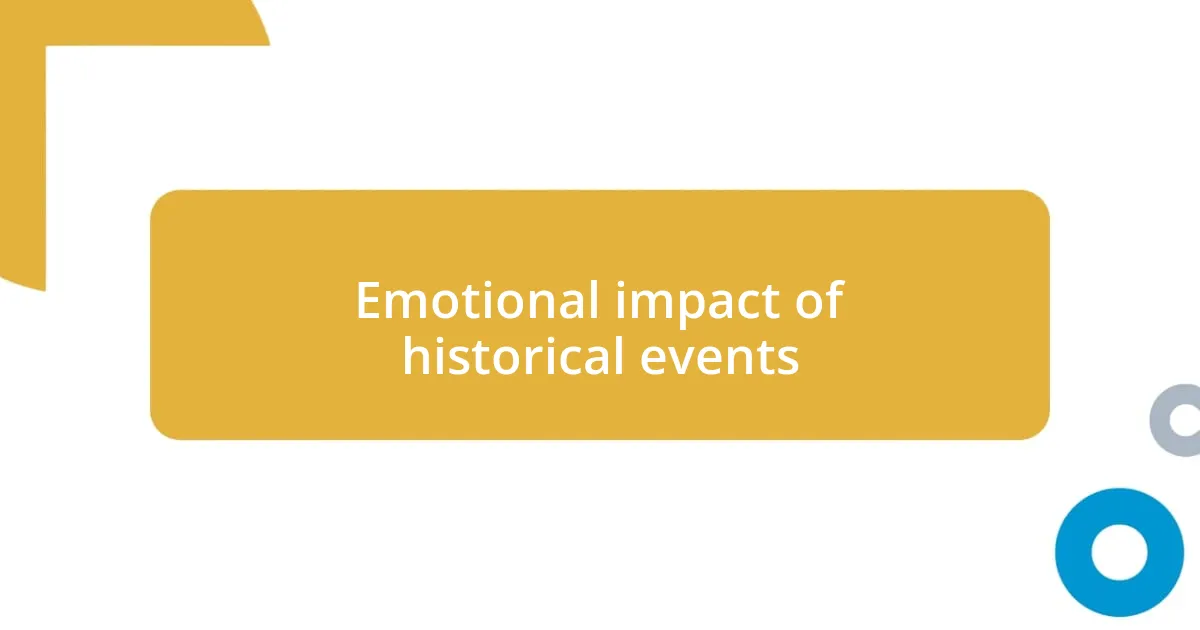
Emotional impact of historical events
The emotional aftermath of historical events can linger long after the initial shock has faded. I remember the day after 9/11, trying to make sense of the devastation stirred a mix of disbelief and sadness. I often wonder how such moments shape our collective psyche. It felt like a collective heartache, with people coming together not just in mourning, but in a profound understanding of our shared vulnerability.
During the 2008 financial crisis, the weight of anxiety settled deep within me. Friends lost jobs, and their uncertainty seeped into everyday conversations, turning hopeful plans into fearful projections. I recall sitting in a coffee shop, the cafe buzzing with hushed worries about the future. It really made me think—how do we process fear on a personal level when chaos surrounds us? I learned that these tough times can also bring long-lasting lessons in resilience and empathy.
Fast forward to the social justice demonstrations in 2020. The emotions I felt were different but equally potent—an invigorating blend of hope and determination. Being in a crowd that echoed our shared commitment to change was electrifying. I can still hear those chants ringing in my ears and feel the energy weaving us together. It led me to reflect: how can a single moment of collective action empower us to challenge injustice? I found that the emotional impact of such experiences can ignite a burning desire for change, one that stays with you long after the rally has ended.
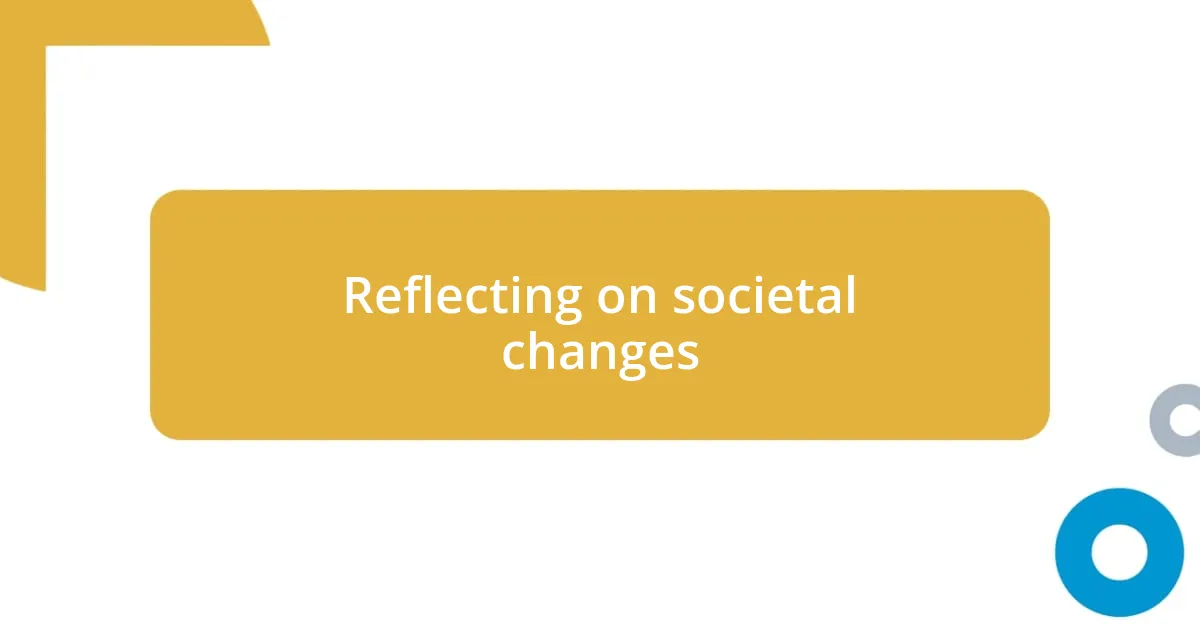
Reflecting on societal changes
Living through historical events inevitably shapes our perceptions of societal change. I remember standing in line at the grocery store in the aftermath of 9/11, catching snippets of conversations around me. The palpable fear hung in the air, yet so did an overwhelming sense of togetherness among strangers. It made me realize how societal ties can strengthen, often in times of great vulnerability. How does adversity bring us closer as a community?
Then came the financial crisis of 2008, when the chatter among friends shifted from weekend plans to discussions about lay-offs and job searches. I can still picture those late-night gatherings, where laughter turned to serious conversations about bills and budgeting. This stark shift made me aware of how swiftly our circumstances can morph, prompting us to reconsider not only our financial habits but also our expectations of stability. It felt like a wake-up call: what does security mean in a world that can change overnight?
Participating in the 2020 social justice demonstrations offered yet another layer of understanding. As I stood among thousands, I couldn’t help but notice the diversity of backgrounds and experiences shared through our voices. It struck me—what unites us in that crowd? Each person carried their stories of struggle, yet there we were, fueled by a collective desire for change. This experience taught me that societal change isn’t just about the issues at hand; it’s about recognizing our shared humanity and the journey we embark on together. Isn’t that the essence of progress?
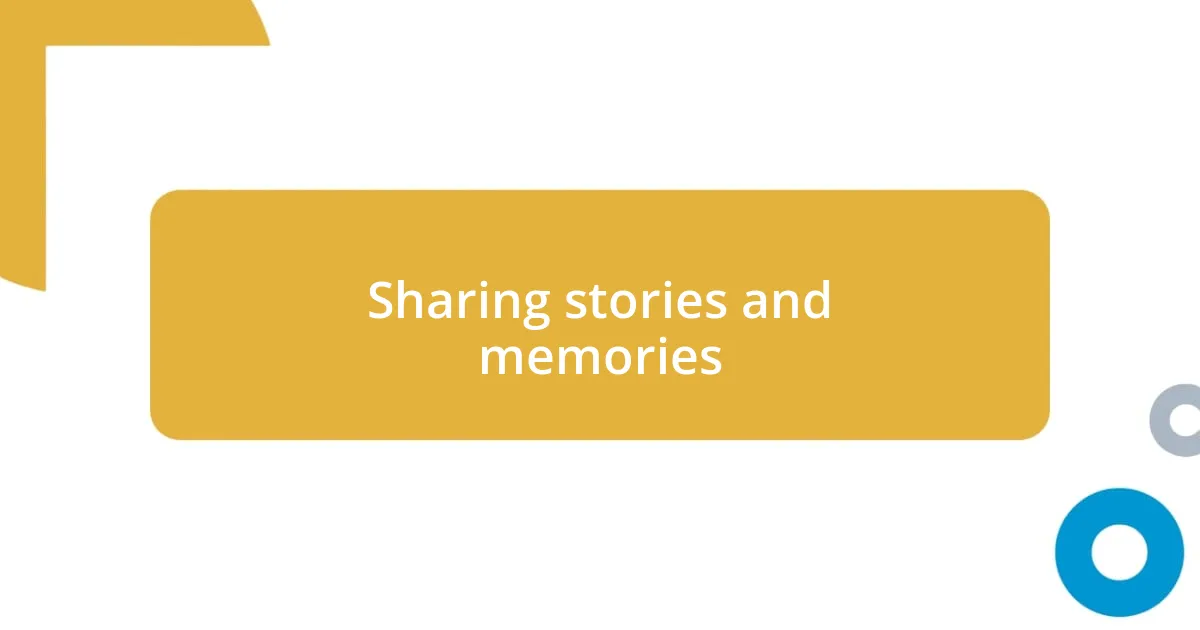
Sharing stories and memories
It’s fascinating how sharing stories can create a tapestry of shared experience. I think back to a neighborhood gathering after the 9/11 attacks, where everyone recounted their unique take on that fateful day. Listening to others’ tales of fear but also of kindness made me realize that our narratives, while personal, contribute to a larger understanding of that trauma. Have you ever felt that sense of catharsis when listening to someone else describe an experience you both went through?
During the financial crisis, I vividly remember a heart-wrenching conversation with a friend who had just lost his job. We sat on my porch, with the weight of uncertainty hanging heavy between us. Sharing his story not only deepened our friendship but also reinforced the notion that vulnerability can spark resilience. As I listened, I thought, how often do we overlook the power of these dialogues to heal and unify amidst chaos?
Reflecting on the vivid chants from the 2020 demonstrations, I was struck by how each voice represented not just an opinion, but a story—a journey filled with struggles and triumphs over injustice. I’d tap into that memory whenever I feel discouraged about societal progress, reminding myself that every shared experience is a step toward understanding. It leads me to wonder: how can we harness these stories to keep pushing for change?
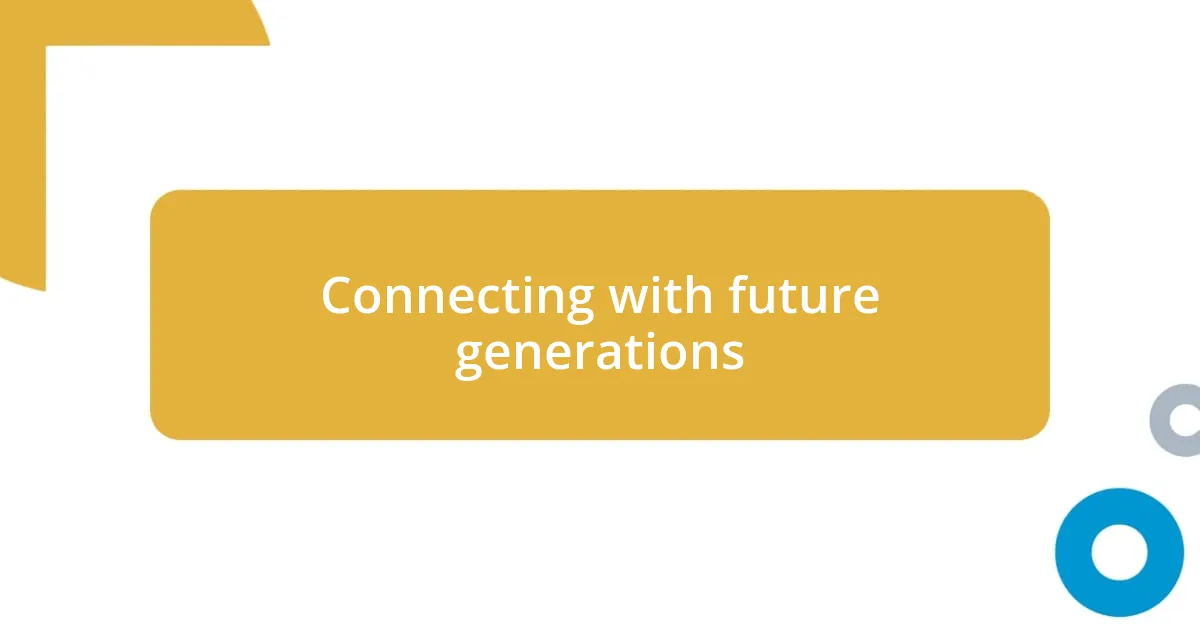
Connecting with future generations
One of the most meaningful ways to connect with future generations is through sharing our experiences. I often think about sitting with my grandmother, listening to her recount stories from her youth during World War II. Each tale, filled with hardship but also hope, bridged the gap between our generations. It made me realize how these narratives carry vital life lessons. When I share a piece of my journey, I wonder if my own experiences will resonate with those who come after me. Will they find courage in my struggles, just as I found inspiration in my grandmother’s resilience?
As I reflect on the times I’ve lived through, I can’t help but feel a deep sense of responsibility to pass on what I’ve learned. I remember my first job interview post-2008 crisis, where I hesitated, battling self-doubt, yet recalling my parents’ advice to keep pushing forward. Sharing that experience on social media sparked a conversation among young adults facing similar pressures. How often do we forget that our trials can be a roadmap for others? When we openly share our lessons, we create a community where future generations can find guidance and strength.
The movements of recent years have shown me the power of youth engagement. I vividly recall attending a rally where young voices echoed through the streets, demanding change. Seeing their passion ignited something in me. It highlighted the importance of connecting across generations; what I’ve lived through can serve as a foundation for their activism. As I witnessed this, I found myself thinking: How can we foster a dialogue that not only honors our legacy but also empowers them to forge their path? This connection is crucial if we want to inspire hope and action for a better future.


